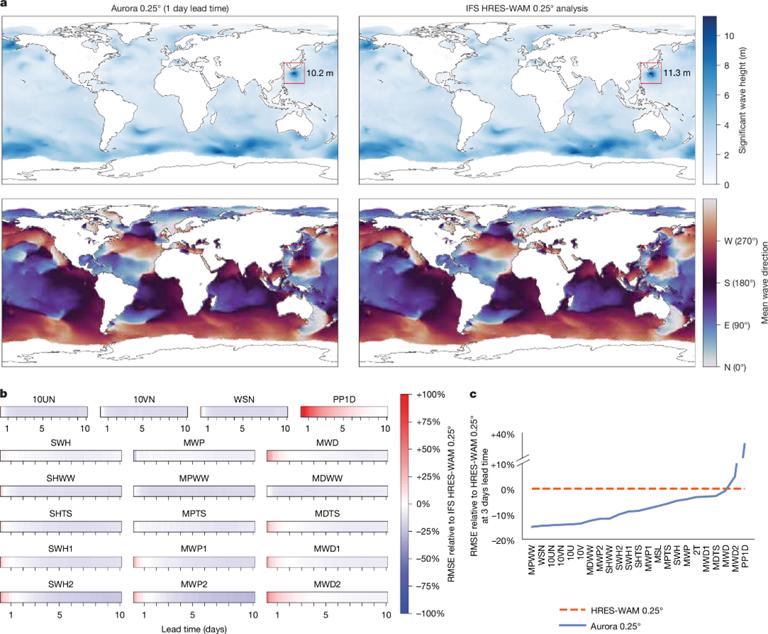Reliable forecasting of the Earth system is essential for mitigating natural dis asters and supporting human progress. Traditional numerical models, although powerful, are extremely computationally expensive. Recent advances in artificial intelligence (AI) have shown promise in improving both predictive performance and efficiency, yet their potential remains underexplored in many Earth system domains. Microsoft launched Aurora, a large-scale foundation model trained on more than one million hours of diverse geophysical data. Aurora outperforms operational forecasts in predicting air quality, ocean waves, tropical cyclone tracks and high-resolution weather, all at orders of magnitude lower computational cost. With the ability to be fine-tuned for diverse applications at modest expense, Aurora represents a notable step towards democratizing accurate and efficient Earth system predictions. These results highlight the transformative potential of AI in environmental forecasting and pave the way for broader accessibility to high-quality climate and weather information.

'Aurora uses state-of-the-art machine learning techniques to deliver superior forecasts for key environmental systems—air quality, weather, ocean waves, and tropical cyclones,' explains Max Welling, machine learning expert at the University of Amsterdam and one of the researchers behind the model. Unlike conventional methods, Aurora requires far less computational power, making high-quality forecasting more accessible and scalable—especially in regions that lack expensive infrastructure.
Trained on a million hours of earth data
Aurora is built on a 1.3 billion parameter foundation model, trained on more than one million hours of Earth system data. It has been fine-tuned to excel in a range of forecasting tasks: Air quality: Outperforms traditional models in 74% of cases; Ocean waves: Exceeds numerical simulations on 86% of targets; Tropical cyclones: Beats seven operational forecasting centres in 100% of tests; High-resolution weather: Surpasses leading models in 92% of scenarios, especially during extreme events
Forecasting that's fast, accurate, and inclusive
As climate volatility increases, rapid and reliable forecasts are crucial for disaster preparedness, emergency response, and climate adaptation. The researchers believe Aurora can help by making advanced forecasting more accessible.
'Development cycles that once took years can now be completed in just weeks by small engineering teams,' notes AI researcher Ana Lucic, also of the University of Amsterdam. 'This could be especially valuable for countries in the Global South, smaller weather services, and research groups focused on localised climate risks.' 'Importantly, this acceleration builds on decades of foundational research and the vast datasets made available through traditional forecasting methods,' Welling adds.
Aurora is available freely online for anyone to use. If someone wants to fine-tune it for a specific task, they will need to provide data for that task. 'But the "initial" training is done, we don't need these vast datasets anymore, all the information from them is baked into Aurora already', Lucic explains.
A future-proof forecasting tool
Although current research focuses on the four applications mentioned above, the researchers say Aurora is flexible and can be used for a wide range of future scenarios. These could include forecasting flood risks, wildfire spread, seasonal weather trends, agricultural yields, and renewable energy output. 'Its ability to process diverse data types makes it a powerful and future-ready tool', states Welling.
As the world faces more extreme weather—from heatwaves to hurricanes—innovative models like Aurora could shift the global approach from reactive crisis response to proactive climate resilience concludes the study.
Sources:
Nature
https://www.nature.com/articles/s41586-025-09005-y .
Provided by the IKCEST Disaster Risk Reduction Knowledge Service System
Comment list ( 0 )
